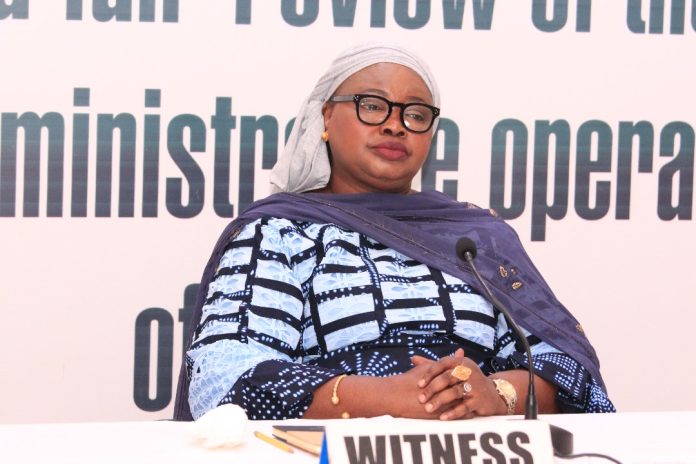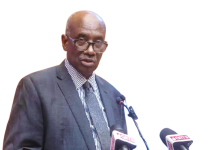Mayor Rohey Malick Lowe of the Banjul City Council (BCC) on 25 June testified before the Local Government Commission of Inquiry, where she faced a detailed and probing interrogation by Lead Counsel Patrick Gomez on matters relating to financial governance, administrative authority, and compliance with local government laws. The testimony, marked by moments of candid admissions and pointed legal clarifications, revealed deep structural problems at the Council and painted a portrait of a local authority grappling with dysfunction, limited capacity, and strained internal relations.
The hearing began with Lead Counsel Gomez outlining the statutory framework for financial management in local councils, particularly the Local Government Finance and Audit Act, 2004. He stressed that authority for expenditure lies in three levels: the Chief Executive Officer (CEO), the Mayor or Chairperson, and the Council as a whole.
“When we talk about authority for expenditure, the idea that a mayor or a chairperson doesn’t have power, the law says something different to that,” Gomez stated. “The law says that three persons. I will refer to the Council as people. I have seen three—that is,, the CEO, the mayor, or chairman as the case may be and Council as a general body—all of them have authority, should have authority for expenditure.”
Gomez emphasised the hierarchy: “The CEO reports to you. Now, you report back to the Council, which you head. The CEO does not have the full or absolute power to decide how much money goes in or out. Above the CEO, there is the mayor or chairman. And above the mayor or chairman, you have the Council.”
Mayor Lowe responded: “I think Counsel is just telling me exactly what the law says. And I think the law has to be implemented. But Council, we don’t operate like that.” She continued, “Because the CEOs and the administration, too, have people behind them. I will not sit here and tell you lies. If I say the mayors don’t have powers, please believe me.”
The Mayor revealed that bureaucratic limitations constrain her role. “You will write to the Ministry just complaining about something, and they will tell you directly, ‘Don’t write to us. It’s only the CEO who has the authority to write to us.” She added: “There are a lot of frustrations in Council. If you have a CEO who doesn’t have a mind, he will relegate you to zero. And this is the truth.”
Lowe said her goal before the Commission was to speak truthfully: “You explain the truth between yourself and God, so that we can be able to maintain the Council to a good standard.”
Lead Counsel Gomez acknowledged her frustrations and confirmed the Commission’s role: “That is the main reason why it is important, like you said, to see wherever fault lies, we will find out. And hopefully, the Commissioners will make recommendations because when it comes to finance, you have technically absolute control over your finances.”
He added: “Council decides how their finances are disbursed and expended. And this, of course, will be in line with regulations – your contracts, who you pay, how you pay them—the only person that you have to be answerable to is the regulations that are governing you.”
Gomez further clarified: “So the Ministry cannot, to a large extent as well, dictate to you your daily expenditure… But of course, you will be audited periodically.”
He reiterated: “Authority for expenditure only rests squarely on three tiers: the CEO, Mayor or Chairperson, and the Council. So what will be the difficulty in this?”
Mayor Lowe responded: “As I said to you, you are quoting from the law. But do we have another law at the Council.”
She continued: “And Council, if we do commission inquiries for up to a million times, and they don’t regularise the authorities or the powers for each, where to start or where to stop—we will continue to have commissions.”
She pointed to the lack of information flow within the Council: “I saw people who passed here before me, there are witnesses, more than 20 of them, and they were explaining about the EU project at the Banjul City Council. And I am at the City Council, I don’t know them, I have never met them, I only saw them sitting here before the Commission.”
The Lead Counsel quoted Section 12 of the Finance and Audit Act to support the assertion that Councils have financial autonomy, apart from salaries, allowances, and emoluments. “If you are paying a contract of one million dalasi, you just have to follow the procurement regulations. And then you pay in the right manner. You don’t have to take any permission from the Ministry.”
He asked: “Did the Ministry ever interfere with your daily expenditure?” Lowe answered: “No, I’m not aware because I don’t have any dealings with that.”
Gomez then questioned the internal controls in place to monitor BCC’s accounts. Lowe said: “I rely entirely on the CEO to upgrade me on Council’s account and to advise me on the way forward.”
She explained further: “For example, if somebody appears to look for a scholarship, I will call him and inform him, and I give him the paper, and there he will advise me. If the budget is already there, then we proceed.”
The Counsel pressed on whether the Council was aware that regulations required limits on financial authority. “Because it appears as if the Council did not know that there should be this regulation to monitor expenditure,” he said.
Lowe denied ignorance: “It doesn’t mean that we don’t know or we don’t know about it. As I told you, I wrote a memo more than twice because this should come from the Council.”
Gomez asked: “Can you do that? Please write it down. Thank you.”
He noted: “The same law that you must seek for clearance, you must consult the Mayoress as the case is in Banjul. The same resolution should also state that the Mayor cannot approve payments beyond, for example, D500,000. If it exceeds this, you must bring it to Council.”
Lowe responded: “So, I can remember there was a time that it was said that the CEO cannot expend more than an amount of D500,000. But I cannot remember any time that the decision was taken in Council that the CEO cannot expend an amount…”
She added: “But one thing I want to make it clear here—if you check the expenditure of Banjul City Council… if you check about eight years ago… what you spend, the amount you spend for D500,000 or above D500,000 is only one time… and if you count it, it will be less than six to seven times.”
Gomez sought to clarify: “What would be very ideal in this circumstance is the overall expenditure in a given year.”
Mayor Lowe confirmed: “Yes, because what I said is true… there is nothing like a ceiling of which if the CEO is to spend more than D500,000, you need to inform Council.”
Gomez emphasized: “You can even say that D50,000—it has to be cleared by the Mayor. Even D10,000 depending on what the Council decides. The amounts are examples. The council has to decide that in the resolution.”
He asked again: “Did Council know about this authority for expenditure?” Lowe responded, “No.”
Gomez concluded: “It can only be deliberate because they’ve already told us that they knew that they had this authority to put the ceiling, they never put the ceiling. It’s a failure on the Council’s side.”
Mayor Lowe explained: “Probably they have ever told me and I forgot. So, we have to go back to the minutes.”
Gomez noted: “We have asked the CEO. We don’t even see a Council generally that would adhere to this regulation. They don’t have a resolution. At least we haven’t seen it. They didn’t produce it.”
He said that even if Councils like KMC operated by informal thresholds, not having a resolution was a serious governance lapse. “That is how, like you were saying, sometimes the actual operations of the Council are different from what the law says.”
Mayor Lowe responded: “Yes. And, Lead Counsel, I want you to understand one thing. Banjul City Council is very, very different from other Councils.”





















